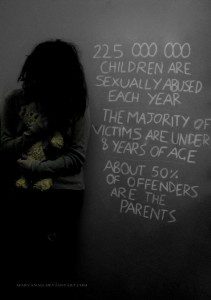NOTE: I will be continuing the series on tolerance and parenting in the next installment. The following article includes descriptions of child molestation and violation. Reader discretion is advised. –LMNC
 Adult survivors of incest and sexual molestation have a battle they fight on a daily basis. This war that is waged, in silence, beyond prying eyes, means that we spare society having to look at the shame that has been perpetrated against the victim. However, when a news story hits or a favorite book turns to sexual violence as part of the story line, survivors of these types of trauma must decide whether to stay silent or let something of our moment to moment battle show to the greater world.
Adult survivors of incest and sexual molestation have a battle they fight on a daily basis. This war that is waged, in silence, beyond prying eyes, means that we spare society having to look at the shame that has been perpetrated against the victim. However, when a news story hits or a favorite book turns to sexual violence as part of the story line, survivors of these types of trauma must decide whether to stay silent or let something of our moment to moment battle show to the greater world.
Dylan Farrow recently faced this choice on a grander scale than most. Woody Allen, recipient of a life time achievement award during the Golden Globes on January 12, 2014 and Dylan Farrow’s father, is her alleged perpetrator. She took her voice, which had been publicly silent on this matter, to the New York Times, where she confirmed details about her experiences at Allen’s hands and body (allegedly).
This wasn’t what disturbed me. I have always known that those most revered in life are often the ones with the greatest derelictions. Typically it is because they have an ability to keep the vilest of offenses at bay through threats, misdirection and outright attack against those who seek to expose the truth.
It was Barbara Walters who distressed me. Keeping in mind that Walters is no more suited to judge the veracity of Dylan Farrow’s claims than anyone beyond Farrow and Allen, she took to her show The View, on February 3, 2014, defending Allen and stressing her belief in his innocence.
I don’t watch The View. To be quite clear, I actually despise The View and would never, ever consider being a guest on that show. Also, to be fair, I personally think Barbara Walters is a manipulator who has her own opinions. I feel her pieces are not unbiased and she is either directly or indirectly trying to prove her opinions to those who watch her. Hence, why I do not watch The View.
However, I was in a doctor’s office with my sick child where the television was turned to The View for entertainment. I watched in horror and complete and utter disgust as Walters compounded my discomfit by talking about what a great father Allen was to his new daughter. I watched as any chance Allen’s new daughter might have of ever being believed was scrubbed away by Walter’s surety of Allen’s innocence. I cringed in sympathy with Allen’s other victims, nameless actresses and children who wanted some movie part and were forced to pay for that privilege with their bodies. These victims are sure to understand that Allen is untouchable, Allen’s right to harm others solidified by Walter’s caustic statements.
To be fair, I have no personal knowledge of whether or not Woody Allen sexually molested Dylan Farrow. I have no personal knowledge of whether or not Woody Allen has other victims out there who are silent in the face of the adoration and admiration being heaped upon him by powerful people in the film industry. I do know about sexual molesters, though. I also know about the studies done about false allegations of sexual abuse.
Did you know that four different states (Florida, Missouri, Vermont and Virginia) reviewed records and determined that intentionally false reports comprised less than 1% of unsubstantiated reports of child abuse (0.00999634 out of 100 unsubstantiated reports)?[i]
Let’s break this down. Child abuse is the misuse, neglect, sexual abuse, physical abuse and emotional abuse of a child, according to the Child Welfare System Works governmental group. It is important to understand that only substantiated claims of sexual abuse are pursued by police departments. This means that physical evidence is critical — keeping in mind that sexual abuse does not have to be rape and can include penetration by hand or object. In fact, when small children are victimized by adults, sexual abuse often does not include rape. The physical difficulties of sexual copulation should be obvious. Sexual abuse can include what Dylan Farrow describes, however: intimate touching of inappropriate places, over attention of a sexual nature. In fact, if a perpetrator is careful, his abuse will not leave any physical evidence for authorities.
How exactly is a child going to prove these types of advances? It becomes the child’s word against the perpetrator’s. Allen, whose money and prestige allows him lawyers and influence, coupled with a carefully developed public persona, is difficult to take on. Walters ended her tirade about Allen’s innocence by saying that the matter of Dylan Farrow’s molestation was “investigated and unsubstantiated,” as if this alone was proof of Woody Allen’s innocence.
Bullshit.
It just means that the police did not have enough evidence to convict. That Dylan Farrow’s mother made decisions to protect an already fragile child and not expose her to harsh public scrutiny until she made that choice. Dylan Farrow is twenty-one now, and I can guarantee that the open letter in the New York Times was written with the input of a psychiatrist, counselor, her mother and other supporters that are intimate to her. Keep in mind that when reviewed by professionals who are trained to spot child abuse, they found only 1% of the allegations lacked merit. That did not mean the perpetrators were arrested or even charged. Merit and evidence are two distinctly different issues in child abuse cases.
My most vivid recollections of sexual abuse never involved penile penetration. More often my memories revolve around the build up to a sexual encounter then followed by periods of a fugue state. Meaning, I would not remember days or weeks after a memory of my mother being out of the house, my sister being at college, my brother being gone, my father naked and erect, me in my bed in my bedroom with no protection and him coming to me pleading with his eyes to accept him without a fight because there was no one to rescue me anyway. Before penetration I would black out, a coping mechanism my mind has used to protect me from the worse violations perpetrated against me.
My Technicolor recollections are not fit for posting here. As those things occurred, there was always the hot breath on the top of my head and rumbling words of encouragement and secrecy.
I recently told my counselor that most people think that sexual molestation is a violent affair, but is it not. Sexual molestation is an insidiously quiet act perpetrated in the hushed whispers, horrific words of secrecy and normalcy, shattering words meant to invoke hopelessness, fear and self-doubt.
According to Emory University, Dr. Gene Abel conducted interviews that guaranteed complete confidentiality and immunity from prosecution, and found that male offenders of girls averaged 52 victims with less than 3% of these acts being reported EVER. Male offenders who violated boys had an average of 150 victims each.[ii]
Although there is no clear profile in regards to someone who molests children, we do know a few things about those who go undetected, uncharged and free from prosecution. Logic tells us these people have a huge power of persuasion. They can convince their victim that they will die if they tell or that they will not be believed. This also means that outside of times where they are violating young children, they are likely to present a façade that is, in a word, impeccable. They utilize mental manipulation in dramatic fashion, often leaving their victims in question of their own sanity. This is done during the physical act of abuse and at other times, when the perpetrator belittles the victim in front of others or dismisses them as “over-imaginative” or “a little crazy.”
The public needs to stop obsessing over the physical acts of sexual violation perpetrated upon children and think about the broader, day to day, moment to moment violations suffered by those children. These violations are the ones that they carry with them into adulthood. These are the violations that create dysfunction that leads to a lifetime of post-traumatic stress (PTSD), major depression, bouts of suicidal tendencies and body image issues.
I know what people think when issues like this surface.
It happened years ago, what does it matter today?
We are giving him an award for his films, right? What happened in other places is irrelevant.
He and her mother were divorcing, right? So it was about money, and that girl just got used by the mother against the father. It happens all the time.
These thoughts are similar to other uncharitable thoughts people have and no one ever confronts. So let me confront these.
Dylan Farrow is still living with Woody Allen’s violation. It is wildly unlikely that Farrow’s mother had the psychological skill to implant such specific false accusations into a young child’s brain.
Allen’s films, I am sure Allen would argue, are part of him. They are no more indistinguishable then his clothes would be from his person. Given this, when we revere someone who has allegedly done things as vile as sexual molestation, aren’t we telling perpetrators and victims a few things?
- Perpetrators: Have enough money and prestige and everyone will look the other way when you violate children.
- Victims: If your perpetrator is well funded and connected, stay silent. No one will believe you anyway.
- Perpetrators: If you leave behind a body of work considered successful, the fact that you ruined others’ lives with your vile predications will not be relevant.
- Victims: Unless, as a small child, you can overcome the mental and emotional abuse that comes hand in hand with the physical violation you suffered, and in a time and space that is optimum, of your own free will, tell some stranger (because your mother might influence you unduly), we won’t believe you. Especially if you grow up, get therapy and then seek out some type of justice for yourself, because then you are just being petty and living in the past. Get over yourself. It doesn’t matter that less than 1% of children are bringing false allegations, you will always be part of that 1%.
This is a subject that is difficult to read about and infinitely difficult for me to write about. However, as a society, confronting myths around sexual abuse is important. As parents, we have an opportunity when these stories come up to have discussions with our children. If you notice a child under the age of five playing with his or herself, you should acknowledge this behavior in a healthy and proactive way. “I think it is fine that you like to pleasure yourself, however, you should do in the privacy in the bathroom or your bedroom, and no one should ever do it for you. Why don’t you go to the bathroom now and come out when you are finished? Okay?”
Children ten years old and younger can be asked outright:
“No one has ever made you feel uncomfortable when they touched you, have they?”
“Is there an adult or a babysitter or anyone who makes you feel uncomfortable?”
“No one has ever told you to keep a secret because if you don’t, they will hurt you or me, have they?”
“You know you can tell me anything, anytime, right?”
When children are over the age of ten years or display the appropriate amount of mental and emotional fortitude, discussion should go further. “What do you think sexual molestation means?”
“What is rape, do you think?”
“Can only boys rape girls?”
“Have you ever touched someone and felt weird about it?”
When children become teenagers and young adults, the information should be explicit and definitive. “Did you know if you are over eighteen in Georgia and have sex with someone under eighteen, you can be charged with statutory rape, even if both parties consent?”
“You know if you are drunk or high, that doesn’t give anyone permission to be sexual with you, right?”
“Photos last forever, especially in the web era, and just because you agreed to have sex doesn’t mean you have agreed to be photographed or videographed.”
“No means no, right? You can have the condom on and have already been having sex, if he or she says, ‘No. Stop,’ then you have to stop.”
In all this conversation, the most important thing is this: If a child braves the horrors of their personal hell to come forward and tell you they were molested and/or raped, BELIEVE THEM. The number one indicator of children growing up without lasting effects after sexual molestation is the support, love, and belief of their mother and intimate family members. This support should be backed up by a disavowing of the perpetrator, whether or not they are prosecuted.
I choose to believe Dylan Farrow. I publicly call others to avoid any movie or entertainment produced by Woody Allen. I believe there are fifty-one other children out there suffering in silence and disbelief after what has been done to them.
[i] Sidran Institute: Trauma Stress Education and Advocacy. How often do children’s reports of abuse turn out to be false? Brochure. Accessed on February 4, 2014.
[ii] Sexual Assault of Young Children as Reported to Law Enforcement: Victim, Incident, and Offender Characteristics, by Howard N. Snyder, Ph.D.; National Center for Juvenile Justice, July 2000, U.S. Department of Justice, Office of Justice Programs

















